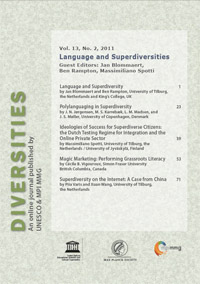Superdiversity on the Internet: A Case from China
by Piia Varis and Xuan Wang (University of Tilburg, the Netherlands)
To cite this article: Varis, P., & Wang, X. (2011). Superdiversity on the Internet: A Case from China. Diversities, 13(2), 71–83. https://doi.org/10.58002/vvt6-m905
The Internet is the superdiverse space par excellence – a space of seemingly endless possibilities for self-expression and community formation. Yet, online environments are not characterized only by happy heterogeneity: rather, we are able to see multiple layers of normativity in the form of self-, peer- and state-imposed norms. That is, though allowing for the continuous diversification of diversity, the Internet is also a space where diversity is controlled, ordered and curtailed. This paper illustrates these dynamics through an examination of a Beijing-based rapper and his online activities. What emerges from this investigation is a superdiverse as well as normative space where diversity is constrained by a complex of normative struggles, as new forms of meaning-making are accompanied with new systems of normativity. The driving force in such increasingly online normative processes is, instead of locality or localization, the quest for authenticity.
|
